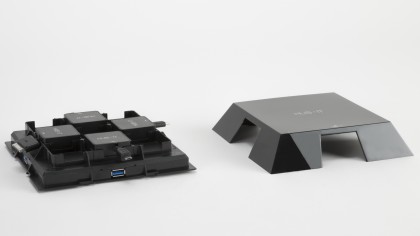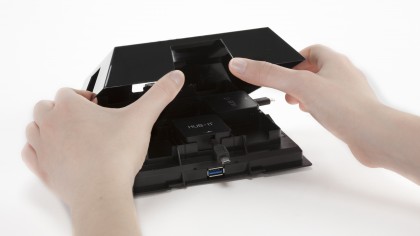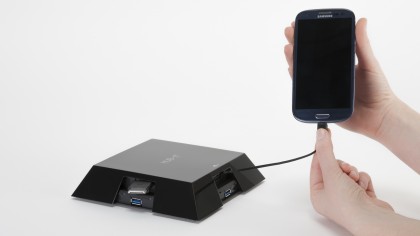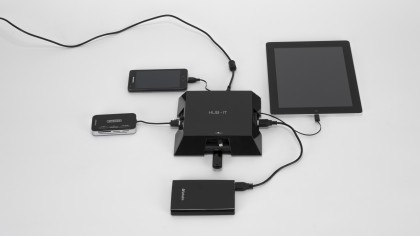TechRadar Verdict
Despite the absence of portable power modules, the Hub It will take on whatever power consumption needs your electronics can throw at it.
Pros
- +
Plenty of ports
- +
Sleek, unimposing design
Cons
- -
Cords are a bit short
- -
Can it store a charge?
Why you can trust TechRadar
Moore's Law correctly predicted that the number of transistors on a circuit board will double every two years. What it didn't accurately predict, however, is that in 2014 it's more likely that the amount of devices you own will double just as quickly.
This wouldn't be a problem if the amount of outlets in your room doubled, too. Thankfully, Eggtronic's Hub It charging and transfer system is here with ports in spades.
The Hub It was born out of a desire to charge several devices at once and transfer data at up to 5GB/s from multiple devices to your PC or Mac. To make it happen, Eggtronic's black, ziggurat-shaped plastic system has four interchangeable cables and three open USB 3.0 slots that allow you to charge up to seven devices at once.

For $79.99, you get the basic kit that includes the Hub It station, one mini-USB connector, a micro-USB connector, one 30-pin connector compatible with older iPhones, and a lightning cable connector to attach newer iOS devices. More connectors are available for purchase for $7.99 each on Eggtronic's website, but the starter kit does a good job covering the essentials.
Design
It shouldn't be understated: the Italian-designed matte black plastic shell is actually quite eye-catching. At 6.7 x 6.7 x 1.3 inches (W x D x H), the Hub It can lay inconspicuously on any open shelf near your desktop or laptop and go anywhere by easily fitting into most laptop bags.
The top cover is removeable and is accessed by lifting two connecting snaps located along the bottom edge. The edges, especially where the cover lifts off, are sharp – not that this is dangerous to anyone over the age of 5, but soon-to-be-parents may see this as a reasonable concern.

Open up the cover and you'll find nine customizable compartments. One on each of the four sides is for a type of cable (micro-USB, mini-USB, 30-pin, and lightning connector), while the other five seem to be for some sort of battery expansion slot that could help Hub It serve as a mobile battery pack.
Sign up for breaking news, reviews, opinion, top tech deals, and more.
I use words like "could" and "seem" because there's almost no literature or products available on Eggtronic's website that explain these empty slots. In the manual, there's mention that these spaces are reserved for "an internal battery, wireless charging, etc…" but an Eggtronic representative told me it would be a few weeks before this product becomes available to the public.

Performance
The Hub It took 2 hours and 36 minutes to bring my iPhone 4S from no charge back to full strength – the same as it takes the standard Apple charger – although the Hub It at least benefits from illuminated LED lights that indicate if a battery is still charging or ready to go. Testing the proposed 5GB/s transfer rate, on the other hand, proved to be a bit tougher.
I ended up using a program called Check Flash to run a read/write test on a flash drive plugged into one of the Hub It's four USB 3.0 ports. At maximum speeds I saw a write speed of around 5MB/s and read speeds of 15MB/s, a far cry from the 5GB/s number touted in the manual.

Understandably, this 5GB/s rate is more likely the theoretical maximum allowed by USB 3.0 technology and not a result the average user can expect. It's a minor flaw in the product's overall striking visage, but it was a claim that was aching to be tested.
All these open ports may sound a bit unnecessary at first, but by the time you connect your mouse, keyboard, external hard drive, iPad Air, camera, cell phone and 3DS XL, you'll be happy there's no less than seven of these suckers at your disposal at any one time.
The only major qualm I had while charging products was that the extendable, 7.5-inch cords are too short. Sure, they're fully functional. But sit two people on opposite ends of a table and ask them to both try to use the devices currently hooked up to the Hub It and you'll have a problem.
Longer cables would've allowed more users to concurrently use their device while charging, and by limiting the cord size to under 8 inches it's a tight squeeze to get everyone near their respective property.
We liked
For $80, you're actually getting a decent value. Seperately, all these chargers would cost about $5 to $10 each, depending on which site you use. Factor in the ability to connect it to a computer (and in the future possibly use it as a portable battery), and the Hub It becomes a solid solution for a niche audience that needs it.
We disliked
The device isn't exactly limited to a single user, but get four friends to try and concurrently charge and use their devices and you'll soon wish you hadn't invited company over. Plus, it would've been nice to get one or two additional USB cartridges that support wireless charging or an internal battery just to solidify the point of expandable units.
Final verdict
It's hard to pan a device that does so much. Hub It serves the purpose of most USB hubs we've seen before with the added perk of interchangeable modules that can accommodate any array of devices – so long as you're alright with ponying up some extra cash. Absent portable power modules aside, Hub It is a smart solution to a logistics problem techies have been facing forever.

Nick Pino is Managing Editor, TV and AV for TechRadar's sister site, Tom's Guide. Previously, he was the Senior Editor of Home Entertainment at TechRadar, covering TVs, headphones, speakers, video games, VR and streaming devices. He's also written for GamesRadar+, Official Xbox Magazine, PC Gamer and other outlets over the last decade, and he has a degree in computer science he's not using if anyone wants it.
